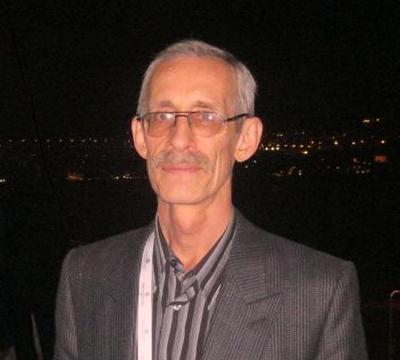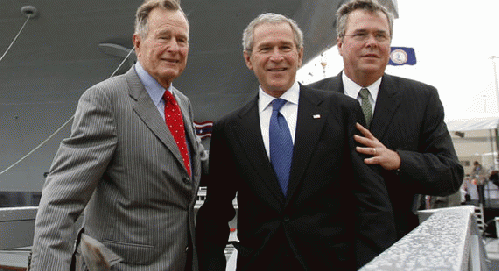Elites, dynasties, families, and even tribes have always been governing society. Conspiracy theorists refer to such elements as "the deep state," a coalition of (some believe) occult forces exercising real power regardless of who is nominally in charge. Does the US have its own "deep state" too? Yes, but only a few families can be called both deep staters and political leaders. Logically, Bushism would mean a family dynasty from the deep state, in harmony with the elites, able to convince the voters that they are providing the best political leadership, given the economic system in place.
This clan rule has been the norm in pre-capitalism, and continues to some extent in the third world; for example, in Syria under the rule of the Assads and it seems to be shaping up for the Karimovs in Uzbekistan. But it has not been the rule in the West. America had a father-son president in the 19th century (John and John Quincy Adam) and a grandfather-grandson (William and Benjamin Harrison). The Roosevelts, too, produced two presidents, uncle and nephew Theodore and Franklin. The Kennedys had their own dynastic ambitions but were stopped after just one president, John F., because both he and his most likely successor Robert were assassinated. But there was no sense of a dynasty in any of these instances. None of them were deep staters.
The Bush clan is by far the most important such dynasty. In addition to two presidents and a likely third, they also include congressmen, senators and governors. Just how coherent their politics are is moot. But the Bush family has been intimately connected with power for a century now, and thus are supported by the deep state to be president, who is (or should be for the powers that be) mostly a figurehead, following the policies necessary to maintain the US as world hegemon.
With the collapse of the Soviet Union in 1991, President Bush professed the goal to be "a new world order--a world where the rule of law, not the law of the jungle, governs the conduct of nations ... an order in which a credible United Nations can use its peacekeeping role to fulfill the promise and vision of the UN's founders." This was his vision of US world hegemony, using the UN as a cover, and based on a consensus within the hegemon. The basis for Bushism (whether or not a dynastic version) was in place.
The older Bush was the most nonpartisan president of the 20th century. "For him, understanding 'the other side', going for fifty-fifty deals and almost always preferring a good compromise to a confrontation were quintessential American values," writes Asharq Al-Awsat columnist Amir Taheri. He was respected, even a friend of Lyndon Johnson, and Bill Clinton, the man who denied him a second term as president. In fact, Bill Clinton is now regarded as a "Bush brother from another mother," as Bush II noted in 2014, adding that his own father "serves as a father figure" to Clinton.
This NWO ambitious plan did not pan out so well, ironically to a large extent because of the policies of Bush II. The consensus feeling of the Bush senior period gave way to the vitriolic politics of the Clinton, Bush II and Obama eras, despite the fact that their policies are not much different: The wars in Afghanistan and Iraq under Bush II proved disastrous, but once in place, had to be brought to some kind of conclusion with the US saving face, under an avowed anti-war Obama. (Imagine the upheaval if he'd abandoned Afghanistan and Iraq like the Soviet Union. It could have led to a similar collapse of the hegemon. He would surely have been impeached, assassinated, at the very least, drummed out of office after one term.)
Whether this disastrous Bush II legacy is enough to undermine brother Jeb's chances of election is the most interesting aspect of the upcoming election. And whether Hillary Clinton can snatch the prize as the first woman president, and relatively nonpartisan politician, in the tradition of Bush senior, is what will keep the election interest high.
The emergent Bush dynasty
Elites, not elections, put Bush in power. Says Kevin Phillips, ex-Republican author of American Dynasty, "I'm not talking about ordinary lack of business ethics or financial corruption Four generations of building toward dynasty have infused the Bush family's hunger for power and practices of crony capitalism -- with a moral arrogance and backstage disregard of the democratic and republican traditions of the US government. Deceit and disinformation have become Bush political hallmarks."
Bush senior was not popular in Republican circles, who resented his privilege and connections. Richard Nixon was one; Ronald Reagan was another. Donald Rumsfeld didn't like him, either -- he and a lot of others in the Ford administration thought Bush was a lightweight. In one of Rumsfeld's greatest miscalculations, he put Bush in charge of the CIA, thinking that would put him out of the race.
, Bush fought back and used his deep state connections. He became near-family and a business associate of Saudi princes, whose oil interests need no comment. He funneled arms to Saddam Hussein and then, as president, fought the first Gulf War to oust Saddam from Kuwait, though he wisely held back from a full invasion, unlike Bush II. He was implicated in scandals involving the Iran hostages and BCCI, the rogue bank that financed clandestine arms deals, but despite his many misdeeds (all in the name of fighting communism and promoting democracy) he is now seen as a compromiser, and in comparison to Bush junior, intelligent.
Bush II
But Bush junior jumped on the hawks' bandwagon, flush with the sense that US world hegemony was within reach (after a few more wars). He was very different from his father. The black sheep of the family, who became an alcoholic. His tribute to his father was the invasion of Iraq to killing Saddam Hussein, though Bush senior was against this, despite their bad blood. Compared to Bush junior, Bush senior was indeed a compromiser, or rather had some political sense.
Bush junior's zealous fundamentalism, given the rise of Islamic fundamentalism, spelled bad news for the world. Never have we felt closer to Armageddon (Bush sincerely believes it's a-coming). After 9/11, that allowed him to think of himself as somebody who has a God-ordained role. He saw himself as an anointed leader, and his speeches evoke religious code words: evil, crusade, the ways of Providence, wonder-working power. In his speech to the nation on October 7 2001, announcing the US attack, there were a half-dozen veiled borrowings from the Book of Revelation, Isaiah, Matthew and Jeremiah. For all his evangelical bluster, Reagan did not believe in preemptive war and looks mild in comparison.
(Note: You can view every article as one long page if you sign up as an Advocate Member, or higher).






